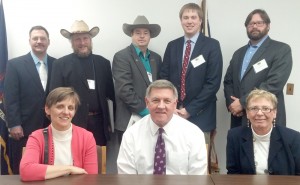Monroe County farmers visit Albany to support every farmer

Farmers from Monroe County Farm Bureau visited with their lawmakers in Albany on March 2 and 3 to make the point that investing in agriculture is an investment in New York. The members hosted a booth at the Taste of New York reception for state lawmakers and staff. They also participated in the annual lobby day where farmers met with both their local and adopted Senators and Assembly members.
One of the highlights was Comptroller Tom DiNapoli’s address at the welcome breakfast. The Comptroller released his new report highlighting the economic importance of New York agriculture. It contributed $37.6 billion to the state economy in 2012 which was a 22% increase from 2007. Farms provide jobs and support the tax base, supply local food to consumers and preserve open space free from development.
At the Capitol, Monroe County Farm Bureau advocated for a number of priorities this year that would create a positive economic climate for farms throughout the state. These priorities include ways farming can help drive the economy, programs that support the availability of local food and ways to expand market opportunities.
Among the specific priorities is support for a refundable investment tax credit. This would encourage greater investment into equipment and also be helpful for younger farmers who may be in greater need of capital to handle the startup costs of owning a farm. Purchasing construction supplies, machinery, or new technology has a multiplier effect supporting additional local businesses and jobs.
Members also asked for more funding to repair the area’s aging roads and bridges. Having a safe, reliable infrastructure is critical for a farm to run an efficient operation and transport fresh product to market. Farm Bureau has also proposed a Farm E-Z Pass to reduce the cost of transporting food along the Thruway and across the bridges into New York City.
Other state public policy priorities include support for the Environmental Protection Fund that provides cost-sharing of important water quality and farmland protection programs that allow farms to reinvest into their farm business. Members also spoke about the need for additional state investment into regional food hubs to assist in getting local food into urban areas and institutions along with support for a state tax credit to encourage even more donations of locally grown food by farmers to those in need. This would help offset the cost of labor, packaging and distribution for food going to their regional food bank.
There was also widespread support for a new funding stream that would assist local school districts in starting up new FFA chapters to support future farmers. There is a growing interest for agriculture education in schools, but financial constraints often limit the availability. New York Farm Bureau is looking to partner with the state, school districts and the farm community to grow local FFA programs.
Provided information





